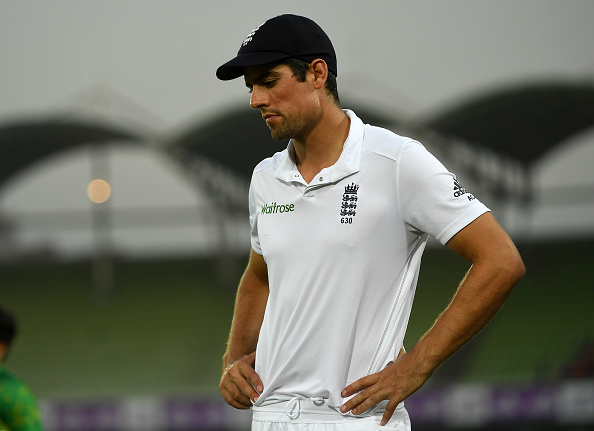Alastair Cook :The captain England needed, not the one it deserved

©Getty
Alastair Cook led the England team through the most tumultuous 4-year period any captain could have had. His own form fluctuated during the stint, but now that he no more has that burden, he can go back to doing what he is best known for - staying put at the crease and scoring runs.
Former Essex captain Doug Insole once said that the role of a captain was one of “a public relations officer, agricultural consultant, psychiatrist, accountant, nursemaid and diplomat”. So yeah, it is not an easy job. Especially when you're captaining an international cricket team. Some people are born into leadership, other achieve it. For Alastair Cook, it was neither of the two. Captaincy was a role he just assumed.
"It interests me, but it doesn't drive me," he had written in his autobiography. Becoming a great batsman was always the most important role. Getting runs for his team automatically helped him become a good captain.
He was first appointed the captain of the English team at the U-19 World Cup in 2004 and ended the tournament as England's leading run-scorer. As he steps down after having captained England for 59 Test matches, more than any other individual, he is also the English batsman with the most number of Test runs and centuries. Scoring heavily as a captain was a habit he developed. In his very first innings as captain, when he stepped in for Andrew Strauss, who opted out of a tour to Bangladesh, he scored a hundred and followed it up with another in the second Test of the series.
For a man so obsessed with scoring runs, it wasn't remarkable that Cook hardly seemed concerned with things other than his own batting, and trusted others with their own decisions. Especially with the bowling unit. He knew he had trustworthy bowlers in James Anderson and Stuart Broad, and allowed them to devise their own tactics and set their own fields. And at the beginning of his captaincy, it paid off too.
His first full-time assignment as skipper came when he toured India, which has a reputation
What he did in that series was simple. He concentrated on what he could do best. Racking up
However, allowing everyone to do their own thing might not be such a good idea, when your team has a certain Kevin Pietersen. Getting him back in the side was not an easy decision, especially after the infamous 'Textgate'. Cook presided over his reintegration into the team and ensured the past stayed in the past. Pietersen responded to the trust shown in him by scoring a magnificent 186 in the second Test at Mumbai, an innings that many
But things then changed. That he did not have a grip on his own team was evident when in 2013, some England players urinated on the pitch after they won the Ashes at the Oval. Everyone knew that was not something Cook himself would have done or even endorsed. Things were only beginning to get bad. In 2014, English cricket and Pietersen had another fallout, and Jonathon Trott and Graeme Swann decided to retire. If Mike Atherton is to be believed, no England captain had ever had to endure a more tumultuous year. The same year, he lost not only his ODI
After a bad couple of years, Cook returned for the third phase of his captaincy, where he had a new-look, younger team to lead. And this time, he took charge. When the Australians came back for the Ashes, he showed that he was a different captain now. He declared an innings when his team was nine-down allowing his bowlers to have a go at the opposition batsmen before lunch. He experimented more with his field placements now, once giving Joe Root a helmet and putting him at short third slip. At the end of the series, he became only the third England captain, after Mike Brearley and WG Grace, to win two Ashes series at home. For a man who did not take captaincy seriously early on, being third on a list followed by those two greats was a big deal.
His batting
It's almost certain that Joe Root will be named as his successor, and the transition this time will be much easier than when Cook took on the captaincy. And now that he is relieved of this burden, he could go back to what he does best. Batting for hours and hours and scoring in heaps. And if he does that, he'll make the job for the new captain much easier, just like he did for himself.
